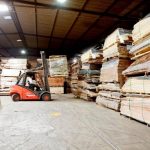Wood industry waste is expected to bring in from 450-500 million USD in export value when used to produce pellets.
Wood industry “waste” is used to produce pellets
Wood chips, shavings, sawdust, scraps, twigs, etc. are all waste products of the wood industry in Vietnam. It seems to be just waste, but these waste products are expected to bring in from 450-500 million USD in export value when used to produce tablets. This is a kind of clean energy fuel, which can replace coal, gasoline, oil, etc., suitable in the journey of greening and protecting the environment of many countries.
Smart Wood Vietnam Joint Stock Company started exporting wood pellets from 2013. In just 8 years, orders of wood pellets exported to the Korean market have increased 18 times.
Mr. Nguyen Ba Duy – Deputy Director of Smart Wood Vietnam Joint Stock Company said: “Currently, we have signed a contract with Thermal Power in Korea until June 2022.”
Directly selling wood pellets commercially with Japanese and Korean thermal power plants, one unit said, these countries aim to become zero-emission countries from 2050. In which, pellets are expected. will meet 38% of total energy demand in Japan by 2030.
“This year, we expect to sell about 550,000 tons, equivalent to nearly 20% of the Vietnamese market,” said Nguyen Hoang Tan, Vice President of Asia for Energy, Cellmark Group, Sweden.
According to the Vietnam Wood and Forest Products Association, pellets are in the group of 5 items with the highest export value of the wood industry. Vietnam is the world’s second largest exporter of pellets and it is forecasted that this product will continue to grow in the trend of using clean fuel.
Mr. Ngo Sy Hoai – Vice Chairman of Vietnam Timber and Forest Products Association said: “We can get 450-500 million USD. Vietnam has a comparative advantage in the production of these pellets because the main input materials for tablets are currently using sawdust waste, shavings, peeled paperboard…”.
In the first 9 months of this year, Vietnam exported 2.6 million tons of pellets, it is forecasted that the whole year exports will reach about 3.2 million tons.
Remove the “knots” to export wood pellets “have a good season”
Input materials are not picky, processing facilities do not need to invest too much in technology. Therefore, the wood pellet industry is forecasted to create opportunities for many businesses. However, in order to export in both quantity and price, the wood industry needs to have a more comprehensive and methodical business and development strategy.
A wood pellet factory for export to Korea said that the bidding stage to sell goods to a thermal power plant in Korea must go through a commercial intermediary.
“We are a small company to export to countries you have to go through trade. We are looking forward to being able to contact your country to work,” said Mr. Can Van Hieu – Director of Trung Hieu Wood Pellet Factory, Tien Xuan, Thach That, Hanoi.
In addition, many enterprises have not prepared plantation certificates to export high-quality, high-priced tablets to demanding markets such as Japan and Europe. Meanwhile, many establishments use mixed materials, poor quality, unfair competition.
Mr. To Xuan Phuc – policy analyst, Forest Trends said: “If businesses commit to each other to implement quality standards, it will increase quality. This gives a competitive advantage in price for this Vietnamese product.”

According to the General Department of Forestry, the State highly encourages pellet products because it turns waste products and discarded by-products of the wood industry into income for workers. The forestry sector is continuing to promote the certification of sustainable forest management, with the goal of reaching 10 million hectares by 2030. This will contribute to increasing the value of input materials.
“Each certificate comes with a plan and a very tight profile. From there, we will be able to manage in a forest with this certificate how much is the forest’s output, how is the specific exploitation plan. Therefore, having mixed timber or inappropriate certificates, fake certificates will not happen,” said Mr. Bui Chinh Nghia – Deputy Director General – General Department of Forestry, Ministry of Agriculture and Rural Development.
Currently, Vietnam has developed a system for issuing Vietnam’s planted forest certification that is linked to the international forest certification system. Businesses have more options to prepare sustainable forest certificates, creating an advantage when exporting.
Source: VTV.VN












